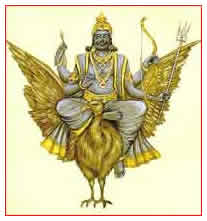ANGULIMAL
King Prasenajit, the ruler of Kosala (was located on the northeast of modern Uttar Pradesh, India), was a disciple of Buddha. Shravasti was his capital. He respected the principle of non-violence that Buddha taught. One day, his royal priest Garg, came to him in distress. An astrologer had predicted that his newly born son was to become a robber and would be a menace to society.
"What should be done?" asked Garg.
The king asked Garg to educate his son well hoping that he may turn out to be a good citizen despite the astrologer's forecast.
The son was named Ahimsaka, meaning a person who favors nonviolence. Ahimsaka proved to be very intelligent and was interested in learning the scriptures. When he was in his teens, he expressed his desire to go to Takshashila, a renowned educational center. His father agreed and Ahimsaka joined one of the most renowned teachers at Takshashila. Soon he became the most favored disciple of the teacher (guru). The teacher was so impressed by Ahimsaka's performance that he told his other disciples to follow Ahimsaka's footsteps. This made them jealous and they jointly made a heinous plan to turn the teacher against Ahimsaka. The teacher fell in their trap and banished Ahimsaka from school. Ahimsaka returned home with a heavy heart.
When Garg, Ahimsaka's father, learned that his son had been turned out of the school, he was furious. He accused Ahimsaka of disgracing his family and threw him out of the house. Poor Ahimsaka. He could not understand why his teacher turned against him and his family was unwilling to hear his side of the story. When he looked for a place to stay, no one was willing to help. He was badly hurt and felt rejected by the world.
Finally Ahimsaka decided to leave Shravasti and move to Kaushambi, a nearby town. Deep in thought, as he was walking down the highway, that passes through a hilly forest, he was attacked by a highway robber. The robber demanded his valuables. Ahimsaka was so frustrated that he unloaded his frustration on the robber and gave him a big blow. The robber fell to the ground and was overpowered by Ahimsaka. He begged for mercy. Ahimsaka decided then that he could make his living as a highway robber.
Soon he started to attack travelers and traders, looted them and killed them. His extreme frustration and anger against the society turned him into an animal. He not only robbed and killed his victims, he collected their little fingers to make a garland. So people called him Angulimal or the wearer of a garland made of little fingers.
People approached king Prasenajit for help. But when Prasenajit sent a small army, Angulimal killed most of them by hurling down huge boulders. The king was amazed by his strength. Prasenajit finally advised his citizens to avoid the highway, until Angulimal was killed.
One day, Angulimal found the highway deserted. He was waiting for his prey when he saw a monk passing by. He was none other than Lord Buddha. Angulimal chased the monk for a long time but mysteriously the monk was always one step ahead of him.
Angulimal shouted, "Stop moving." The monk replied, "I am not moving, I am at rest. It is you who is in constant motion because of your discontent." Angulimal threatened to kill Buddha and use his little finger for his garland. Buddha was not the least disturbed. He stretched his arms out and asked Angulimal to take his fingers if that would make him happy. Angulimal was baffled. He realized his mistake and fell to the feet of Buddha, seeking his mercy.
Buddha took Angulimal to his monastery to teach him the life of an ascetic.. Angulimal listened to Buddha's preaching everyday and started to serve in the monastery, taking care of the sick. Gradually, he transformed from a sinner to a saint. When king Prasenajit came to visit Buddha on his way to capture Angulimal, Buddha told him of the change that had come over Angulimal. The king was pleasantly surprised and left Angulimal in Buddha's care.
A few days later when Angulimal was collecting his alms as an ascetic, he met a boy whose father he had killed many years back. He felt depressed and hopeless.
When Buddha inquired as to the cause of his depression, Angulimal said, "I am a sinner. My hands are stained with blood. I have no hope." Buddha said, "Repentance is the only fire to burn the sins already committed. You are on the right path." Angulimal came to his senses.
One day people recognized Angulimal on the streets as he was out as an ascetic. They thought it to be his new trick and to beat him. Angulimal did not fight back. Later he dragged his half-dead body to the monastery where Buddha received him. He died on Buddha's lap saying, "Father, I am at last at peace with the world."
Buddha, later commented that "Angulimal was a great soul. He had conquered vice, cruelty and anger. He had attained Nirvana (the Eternal Truth)."
%%%%%%%%%%%%%%%%%%%%%%%%%%%%%%%%%%%%%%%%%%%















